JICA Satellite Sessions During the 8th Global Symposium on Health Systems Research 2024 (HSR2024) (Part 1)
2025.01.31
From Nov. 18 to 22, 2024, the 8th Global Symposium on Health Systems Research 2024 (HSR2024)
, a prestigious global health event, was held for the first time in Nagasaki, Japan.
Prior to the main sessions, satellite sessions were held on November 18 and 19 and JICA organized eight of these. An overview of JICA’s satellite sessions that took place on November 18 is provided below. A video recording is available as well.
(Click here to view the report on the satellite sessions that took place on November 19.)
Low-income countries transitioning to a middle-income status face the challenge of ensuring sustainable health systems. In this session, chaired by Makimoto Saeda, Principal Research Fellow, JICA Ogata Sadako Research Institute for Peace and Development (JICA Ogata Research Institute), the introduction of Maternal and Child Health Record Books in Ghana was shared as a successful example of transition from a donor-funded project to a sustainable national system. Speakers from the government of Ghana, JICA, the World Bank and the University of Tokyo presented on their respective roles, and speakers from WHO and the Results for Development Institute (R4D) provided comments. After project completion, Maternal and Child Health Record Books continue to be distributed in Ghana to all mothers and their babies free of charge, using the national budget. They are used for a wide range of purposes, such as keeping health records, registering births and as national health insurance files. It was suggested that the implementation of the Lusaka Agenda, which sets out recommendations for global health with emphasis on the ownership of the government, collaboration between donor agencies and mobilization of domestic resources, can facilitate the transition.
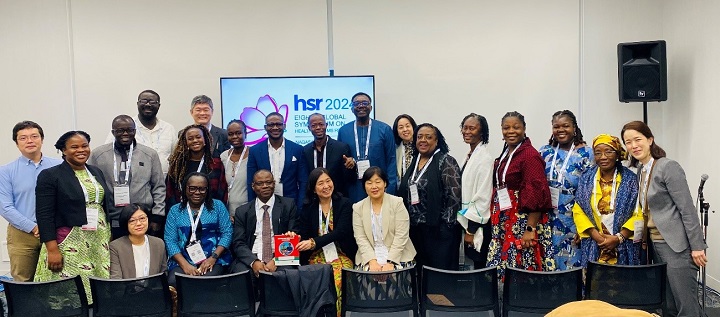
A video recording of Session 1 can be viewed here
.
To achieve universal health coverage by 2025, the Health Sector Reform Strategy 2021–2030 is being implemented in Lao People's Democratic Republic (Lao PDR). In this session, presentations were made on the case of Lao PDR to share the gap between policy formulation and practical implementation in areas that JICA has been providing cooperation for many years, such as national health insurance, qualified human resources for health development, and quality services in health facilities. An open discussion with participants from Africa and Asia followed.
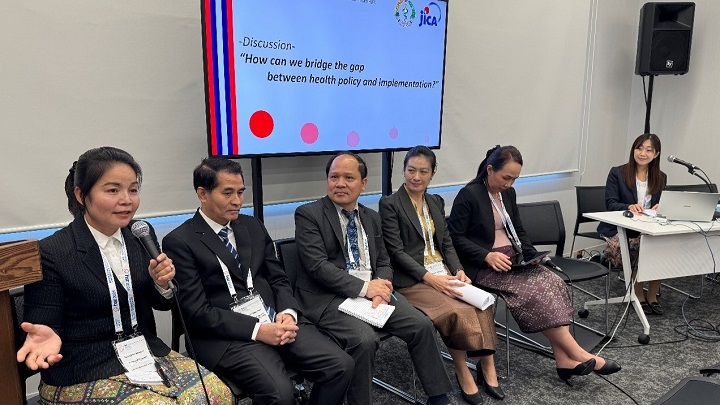
A video recording of Session 2 can be viewed here
.
“Global Health 2050: the path to halving premature death by mid-century ,” published in October 2024, is the third report from the Lancet Commission on Investing in Health. With changes in the global landscape including the COVID-19 pandemic in mind, in order to halve premature mortality by 2050, the report puts together recommendations on health investments. The session was chaired by Makimoto who contributed to the report. Four researchers from Japan, the United States and Norway gave presentations on recommendations around the seven messages from the report, assistance to health development, and pandemic prevention, preparedness and response. Discussion on a wide range of topics such as the need for analysis through health policy and systems research when considering national-level implementation as well as the roles of bilateral aids followed.
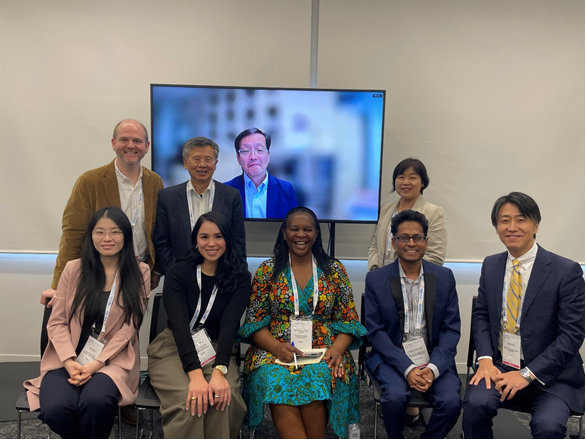
A video recording of Session 3 can be viewed here
.
Having recently published “Improving the health and wellbeing of children and adolescents: guidance on scheduled child and adolescent well-care visits” in 2023, a WHO representative explained the significance of health checkups in the context of the Sustainable Development Goals (SDGs). This was followed by reports on health checkups for infants and toddlers that use “maternal and child health handbooks” in different countries. Panelists from Japan (Children and Families Agency [CFA]), Indonesia (Ministry of Health [MOH]) and Thailand (Ministry of Public Health [MOPH]) talked about scheduled one-month and five-year checkups, six-month checkups, and pre-school-enrollment health checkups, respectively. A JICA Project Expert who has assisted a pilot project in Indonesia commented on the need to design systems from the context of each country, as there are similarities and differences between countries. An UNICEF panelist expressed the need for health systems to work not only on how people can “survive” but also on how they can “thrive.” A participant from Sierra Leone mentioned the potential of maternal and child health handbooks going beyond regions. It was confirmed in this session that the provision of the opportunity for health checkups at certain stages to all children is an investment needed for a resilient society.
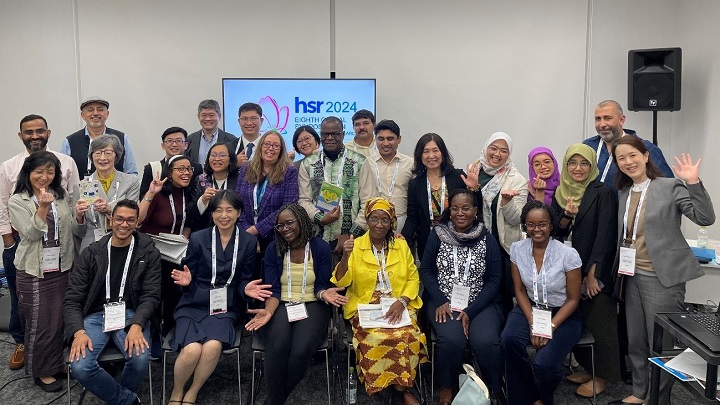
A video recording of Session 4 can be viewed here .
In a set of international guidelines (2018), WHO recommends the use of home-based records for maternal, newborn and child health. To address implementation challenges in different countries, WHO, UNICEF and JICA produced Strengthening implementation of home-based records for maternal, newborn and child health: a guide for country programme managers (2023). Through an interactive workshop using two hypothetical scenarios, session participants analyzed eight factors that are needed for the use of home-based health records: support from high-level government; a coordination mechanism; home-based records; capacity to print and distribute materials to families; budget allocation and funding, recognition of the value of home-based health records by health workers; recognition of the value of having home-based health records by caregivers, especially mothers; and monitoring. Participants then explored ideas for improvements. Comments from speakers from a country that does not have national maternal and child health handbooks (Sierra Leone) and a country that has been using them for many years (Japan) facilitated discussion on the importance of incorporating maternal and child health handbooks into a country’s health system and ensuring that users recognize their value.
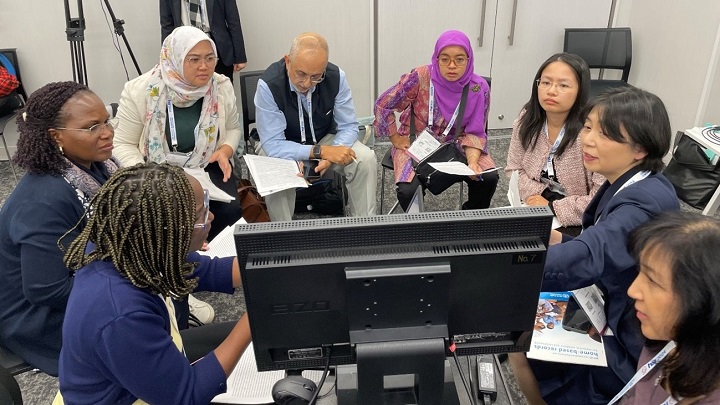
A video recording of the session 5 can be viewed here .
For more information on the speakers in each session, please see the event outline page provided below:
JICA Satellite Sessions in HSR2024 (Day 1)

事業事前評価表(地球規模課題対応国際科学技術協力(SATREPS)).国際協力機構 地球環境部 . 防災第一チーム. 1.案件名.国 名: フィリピン共和国.

事業事前評価表(地球規模課題対応国際科学技術協力(SATREPS)).国際協力機構 地球環境部 . 防災第一チーム. 1.案件名.国 名: フィリピン共和国.

事業事前評価表(地球規模課題対応国際科学技術協力(SATREPS)).国際協力機構 地球環境部 . 防災第一チーム. 1.案件名.国 名: フィリピン共和国.

事業事前評価表(地球規模課題対応国際科学技術協力(SATREPS)).国際協力機構 地球環境部 . 防災第一チーム. 1.案件名.国 名: フィリピン共和国.

事業事前評価表(地球規模課題対応国際科学技術協力(SATREPS)).国際協力機構 地球環境部 . 防災第一チーム. 1.案件名.国 名: フィリピン共和国.
scroll